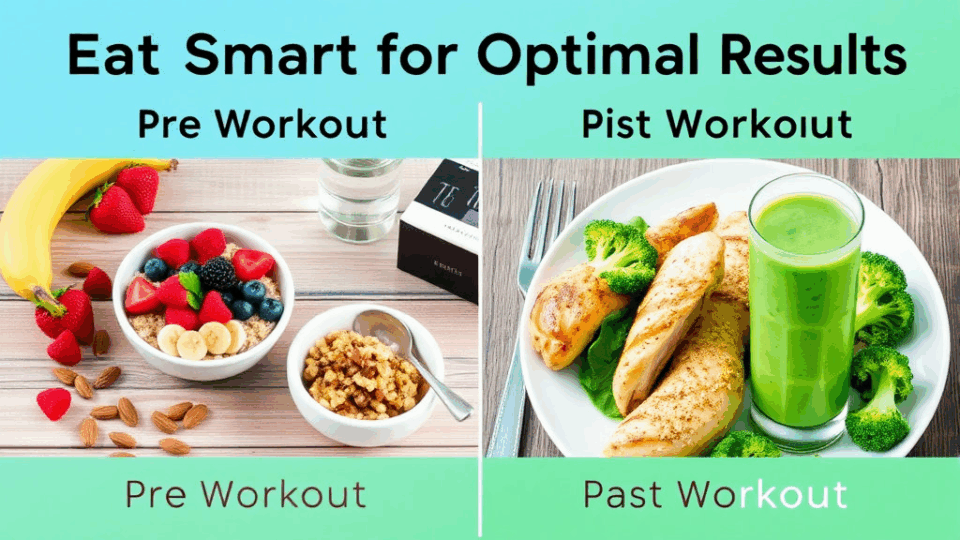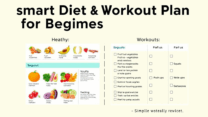
Pre and Post Workout Nutrition Guide: Eat Smart for Optimal Results
Meal Timing Before Exercise

When it comes to getting the most out of your workouts, meal timing plays a crucial role. Eating the right foods at the right time can help boost your energy, improve performance, and support muscle recovery. Ideally, you should aim to eat a balanced meal 2 to 3 hours before your workout. This meal should include complex carbohydrates, lean protein, and a small amount of healthy fats. For example, a bowl of oatmeal with banana and a scoop of Greek yogurt is a great option.
If you’re short on time, a small snack 30 to 60 minutes before exercising can still be beneficial. In this case, choose something easy to digest, like a banana, a slice of whole grain toast with peanut butter, or a protein smoothie. Avoid high-fat or high-fiber foods right before your workout, as they can cause digestive discomfort.
Listening to your body is key. Everyone’s digestion and energy needs are different, so experiment with timing and food choices to find what works best for you. By fueling your body properly before exercise, you set yourself up for a more effective and enjoyable workout session.
Smart Food Choices After Exercise

After a good workout, your body is like a sponge—ready to absorb nutrients that help it recover, rebuild, and get stronger. Choosing the right foods after exercise is just as important as the workout itself. Whether you’ve done strength training, cardio, or a mix of both, your post-workout meal can significantly impact your results and how you feel the next day.
Here’s what your body needs:
1. Protein: Your muscles need protein to repair and grow. Aim for 20–30 grams of high-quality protein within 30–60 minutes after your workout. Great options include grilled chicken, Greek yogurt, eggs, or a protein shake.
2. Carbohydrates: After exercise, your glycogen stores are depleted. Replenish them with healthy carbs like sweet potatoes, brown rice, quinoa, or fruit. This helps restore energy and supports muscle recovery.
3. Healthy Fats: While fats aren’t the priority right after a workout, small amounts of healthy fats (like avocado, nuts, or olive oil) can support overall recovery and hormone balance.
4. Hydration: Don’t forget to rehydrate! Water is essential, but if you’ve had an intense or long workout, consider adding electrolytes to your drink to replace what you’ve lost through sweat.
Quick meal ideas:
– Grilled salmon with quinoa and steamed broccoli
– Scrambled eggs with whole grain toast and avocado
– A smoothie with banana, protein powder, almond milk, and peanut butter
Remember, your post-workout meal doesn’t have to be complicated. The key is to nourish your body with the right balance of nutrients so you can recover faster, feel better, and keep making progress toward your fitness goals. You’ve done the hard work—now fuel your body with love and intention!.
Macronutrient Strategies for Muscle and Recovery

When it comes to getting the most out of your workouts, what you eat matters just as much as how you train. Understanding how to balance your macronutrients—protein, carbohydrates, and fats—can significantly enhance muscle growth, boost recovery, and keep your energy levels steady.
Let’s start with protein. Protein is essential for muscle repair and growth. After a workout, your muscles are like sponges, ready to absorb amino acids to rebuild stronger. Aim for 20–30 grams of high-quality protein within 30–60 minutes post-exercise. Good sources include lean meats, eggs, Greek yogurt, or a protein shake.
Carbohydrates are your body’s primary energy source. Consuming carbs before your workout helps fuel your session, while eating them afterward replenishes glycogen stores and supports recovery. Try to include complex carbs like oats, brown rice, or sweet potatoes pre-workout, and pair them with protein post-workout for optimal results.
Healthy fats are often overlooked, but they play a vital role in hormone production and overall recovery. While it’s best to keep fat intake moderate before a workout to avoid sluggishness, including healthy fats like avocado, nuts, or olive oil in your post-workout meal can support long-term recovery and satiety.
The key is balance. A smart macronutrient strategy doesn’t mean overloading on one group—it means timing and combining them wisely to support your fitness goals. Listen to your body, stay consistent, and remember: nourishing your body is an act of self-care that pays off both in and out of the gym.
Foods to Avoid Before and After Workouts

When it comes to fueling your body for exercise, what you don’t eat can be just as important as what you do. Choosing the wrong foods before or after a workout can lead to sluggish performance, digestive discomfort, or even hinder your recovery. Let’s explore some common foods to avoid so you can make the most of your fitness routine.
Before a workout, it’s best to steer clear of high-fat and high-fiber foods. Items like fried foods, heavy cheeses, and creamy sauces can slow digestion and leave you feeling bloated or lethargic. Similarly, cruciferous vegetables like broccoli or cauliflower, while healthy, can cause gas and discomfort during intense activity. Also, avoid sugary snacks or drinks—though they may give a quick energy spike, they often lead to a crash mid-workout.
After your workout, your body needs nutrients to recover and rebuild. Avoid skipping meals or consuming alcohol, which can dehydrate you and impair muscle recovery. Also, steer clear of processed foods high in sugar or trans fats, as they can increase inflammation and slow down the healing process.
Instead, focus on whole, nutrient-dense foods that support your fitness goals. By being mindful of what to avoid, you’ll help your body perform better and recover faster—leading to better results and a healthier you.


답글 남기기